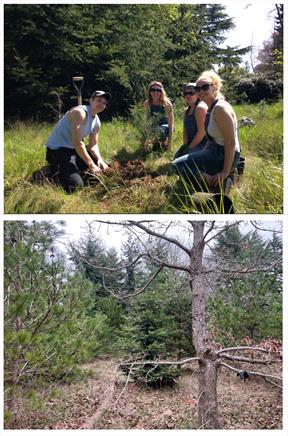Beth with Tuck

Photo by Ben Ford
Dr. Beth Davidow, pictured with her new rescue dog, Tuck, is a veterinary emergency medicine and critical care specialist and practice owner.
"No one could make a greater mistake than he who did nothing because he could only do a little." — Edmund Burke
Fifty-three years ago, the first Earth Day was celebrated with large gatherings of activists around the country and the world. Twenty million Americans took to the street to push for changes in the way we were treating the planet. Bipartisan momentum from that outpouring of energy led to the formation of the Environmental Protection Agency and the passage of the Clean Air Act in 1970, both signed into law by Richard Nixon. The Clean Water Act followed in 1972, and was followed by the Endangered Species Protection Act.
Fifty-three years later, our planet is still troubled. Wildfires take huge tolls on animal and human life and cause economic damage. Floods, hurricanes and tornados are increasing in intensity and frequency. Species are going extinct at an increasing rate, and wildlife populations are decreasing. And while carbon emissions lessened during the first part of Covid-19, they are back up to the same high level as before the pandemic began.
Earth Day, coming up on Saturday, is important to me because many of my happiest times are when I am out in nature with my family and my pets. Natural spaces provide a place to recharge and time to reflect on what really matters. I want these places to always be available and protected for my kids and generations to come.
The problems facing Earth seem so big and so vast that it often appears like there is no way individual actions could make a difference. However, solutions to complex problems usually involve not one change but many small changes.
But what does this have to do with veterinary medicine? While there are no numbers calculated for veterinary medicine specifically, the health care sector in the United States is responsible for 8.5% of national carbon emissions. In 2020, 32 billion pounds of health care plastic was produced globally.
Changes we make in our hospitals do make a difference. In addition, many of these changes will not only be better for the environment but may even save you money.
Actions for veterinary hospitals
Here are 10 moves that are straightforward, easy, good for the Earth and financially savvy:
- Use cloths rather than paper towels to clean counters, wet tables and cages. Most veterinary hospitals spend a lot of money on paper towels. Reusable cloths are relatively inexpensive, wash well and are fast to dry. They also have better scrubbing action and clean cage doors (a prime source of infection spread) better than paper towels. You can use a cloth only once on a dirty cage before needing to wash it for infection control reasons, but the equation is still better for the environment. There is some question currently around microfiber due to microparticle shed in the water, but there are lots of reusable cloths now available that will clean better, create less waste and likely save you money.
- Switch to reusable surgical drapes and gowns. For a long time, veterinarians did use cotton gowns and drapes. However, concerns about barrier protection and wash times led many people to switch to single-use products. A recent Journal of the American Veterinary Medical Association article about a pilot clinical waste audit at Colorado State University's teaching hospital showed that these single-use items were a significant portion of the trash.
Reusable gowns and surgical drapes have improved dramatically and do meet barrier standards now. The newer fabrics also have shorter wash times, so they truly are a better environmental choice. Like cloth cleaning towels, switching to reusables in the operating room may also be more cost-effective. According to Practice Greenhealth, the University of Maryland's Medical Center saved almost $50,000 a year in waste disposal fees by shifting to reusable gowns and drapes.
- Work with your veterinary distributor to decrease packaging. MWI was able to deliver at least part of our weekly order each week in reusable plastic bins rather than cardboard boxes. Although cardboard is easy to recycle in many places, it still takes labor to break it down and energy to recycle. We found the plastic tubs easier to unpack, as well as being better for the environment.
Packaging has a huge impact and often doesn't bring any benefit. As food for thought, consider: In the mid-1990s, Patagonia packaged long underwear with a cardboard insert and a plastic bag. By getting rid of the packaging and simply rolling the underwear and placing a rubber band around it, Patagonia avoided using 12 tons of material that probably would have ended up in landfills, and saved $150,000 each year.
- Use paper, not plastic, bags to send supplies and medications home with owners. Or with a single medication vial, just rubber band it to the go-home instructions. Plastic waste is a huge deal in our society. It is estimated that millions of metric tons of plastic are flowing into the ocean every year. This plastic is ingested by and can kill whales, dolphins, sea turtles and other marine life. Anywhere we can decrease plastic, we should. You can purchase paper veterinary-designed prescription bags from many suppliers. You can also buy plain paper bags and stamp them with your clinic's logo.
- Change your printer's default page set-up margins. The standard margins in Microsoft Word are 1 inch all the way around. Changing your default page margin settings to 0.75 inches can decrease paper use significantly. If this were done nationally, it could save almost 6.1 million trees per year. Of course, it is better still to also use both sides of paper when printing and avoid printing whenever possible.
- Commit to not buying water in single-use bottles. Globally, humans buy a million plastic bottles per minute, and 91% of all plastic is not recycled. According to a 2021 report, if the plastics industry were a country, it would be the world's fifth-largest emitter of greenhouse gases. A filtered-water station is something to consider for clients and your staff. If you need to buy water, buy it in the largest container you can to minimize plastic use.
Tree planting

Photos by Dr. Beth Davidow
Top: Staff members from BluePearl Renton in Washington pause for a picture around one of about 25 trees they planted for Earth Day in 2015.
Bottom: Eight years later, the trees are thriving and around 10 feet tall.
- Evaluate surgery instrument packs for waste. Several years ago, Virginia Mason, a health care system in Washington state, worked to simplify their surgery flow. They discovered that there were a lot of instruments in each pack that the surgeons almost never used. By rebuilding the surgery packs to contain only the instruments the surgeons really needed for each type of surgery, they cut instrument pack assembly and sterilization time by 42% and reduced their inventory by 26%. Not only did this process save time and money, it was easier for the surgeons to set up and reach the instruments they needed. A similar study at a different institution looking at reducing waste for hand surgeons showed the same results.
- Reduce energy use during your unoccupied hours. Make sure not only your computers are in sleep mode but also printers and copiers. Your owner's manual should explain how to set this up, or, if you rent a larger copier, your vendor can help. Set your thermostat lower when the building is not occupied, and make sure lights are off. Occupancy sensors also help reduce energy in rooms where folks are likely to forget to turn off the lights. These steps reduce energy usage and save you money in utility costs.
One interesting thing to consider is the use of "smart" power strips, such as timer-equipped or even occupancy-sensing power strips. These could provide greater safety, too, if you use space heaters.
- Consider battery backup rather than a gas or diesel generator. At our 24/7 emergency hospital, we need backup power. Our location doesn't have a large enough gas line for a gas generator, so our contractor recommended a diesel generator. Not only was the quote $135,000, the generator would spew smoke every time it ran. When we looked at other options, we learned about power walls — battery backups that could power essentials for up to 24 hours. The cost was half that of the diesel generator, and batteries are much more environmentally kind. There are also tax incentives for using battery backups that further reduce the cost. These might be a great option in places with intermittent short power outages.
- Plant trees. I don't believe we can avoid the worst of global warming by cutting carbon emissions alone. That is why trees are so important. While the amount of carbon a tree absorbs varies by species and location, as an example, a coastal redwood is estimated to store 250 tons of carbon during its lifetime. A very fun team-building activity is planting trees for Earth Day. Our hospital team did this in 2015. It was a great day outside together and we made a difference.
Do you have other suggestions and ideas for ways to "green" your veterinary hospital? Email bdavidow@vetidealist.com.
Beth Davidow, DVM, DACVECC, has been an emergency medicine consultant at the Veterinary Information Network since 2003 and also is a member of the VIN Board of Directors. She co-owns Timberline Veterinary Emergency and Specialty, a 24/7 hospital in Seattle. Davidow is also current president of the American College of Veterinary Emergency and Critical Care, and writes the blog The Veterinary Idealist.